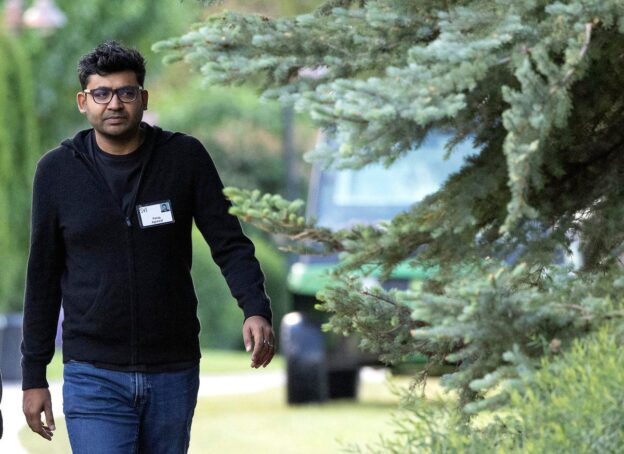Parag Agrawal is leaving Twitter with a payout that could be as high as $57.4 million (Photo by Kevin Dietsch/Getty Images)
Getty Images
When Elon Musk completed his $44 billion takeover of Twitter on Thursday evening, he immediately cleaned house. Among the high profile axes was chief executive Parag Agrawal, the handpicked successor of cofounder Jack Dorsey. All told, Agrawal’s abrupt firing caps off one of the strangest tenures in recent memory for a big tech CEO, and sets the stage for massive uncertainty as the Musk era begins.
The two men represent almost diametrically opposed approaches: the quiet, product-driven manner of an operations tactician versus the brashness of the world’s richest person. Now it’s up to Musk to try to shepherd one of the most important social networks in the world.
“[Agrawal] was in an impossible position as someone who was not going to please everybody,” said Bob O’Donnell, principal analyst at Technalysis. “It was an extraordinarily difficult job that I’m not sure anybody could have handled — I’m not sure Musk could either.”
Musk, Agrawal and Twitter didn’t respond to requests for comment.
Agrawal leaves behind an enigmatic legacy. His exit package is expected to tally as high as $57.4 million, according to research firm Equilar, an eye-popping sum for an executive who held the position for less than a year.
“This is in the hall of fame of golden parachutes,” said Dan Ive, senior equity analyst at Wedbush Securities. “As a fiduciary responsibility, he and the board, they’re popping champagne.”
Some Twitter employees reportedly feel like he didn’t rise enough to the occasion when the company was threatened by a hostile outsider. Behind the scenes, however, Agrawal tussled with Musk, eventually forcing him into a stunning legal battle that ultimately pushed him to follow through on his original bid to buy Twitter. The end result is a blockbuster sale for shareholders — and an uncertain future for Twitter employees and the almost 238 million people that use the platform every month.
Musk and Agrawal’s different styles is best exemplified by their past interactions.
Twitter’s former CTO, Agrawal took the top job at the company last November. He was a talented engineer and longtime confidante of Dorsey, who tapped him to overhaul the company’s infrastructure and expand machine learning capabilities. But whatever long term plans Agrawal may have had as CEO evaporated when Musk entered the picture.
Five months into his tenure, Agrawal went from a new leader learning the ropes to a CEO in an existential fight for the future of the company. At first, Musk had signed on to join Twitter’s board. But as tensions grew, the billionaire reneged and announced a buyout plan, only to try and back out after complaining about the number of bots on the platform. In response, Twitter sued Musk to enforce the merger agreement.
Privately, Agrawal stood up to Musk, court records show. “You are free to tweet ‘is Twitter dying?’ or anything else about Twitter – but it’s my responsibility to tell you that it’s not helping me make Twitter better in the current context. Next time we speak, I’d like to you provide you perspective on the level of internal distraction right now and how it is hurting our ability to do work,” Agrawal texted Musk on April 9 in messages that were disclosed as part of the court proceedings.
Musk responded dismissively. “What did you get done this week?” And a minute later, “I’m not joining the board. This is a waste of time.”
Publicly, though, Agrawal was more reserved. His most notable statement was a long tweet thread explaining the company’s procedures regarding bots. Musk replied with a poop emoji.
Despite the media circus, Agrawal hasn’t gotten enough praise for his ability to keep the company chugging, including releasing new products, said Ali Mogharabi, senior equity analyst at Morningstar Research Services.
“Even during that time, some additional features did come out,” Mogharabi said. That includes Twitter Circles, for tweeting to smaller audiences, and a test for a long-coveted edit button. “They were still operating as normal. You’ve got to give him credit for that.”
As for Musk, in the hours after the deal closed, tumult has already hit the platform: racists emboldened to use the N-word, confusion over the status of Kanye West’s account, and more questions about when people banned from the social network will be allowed to return.
In the meantime, it appears Musk has already made a major policy choice: Convening a “content moderation council” to rule on content decisions and account reinstatements, seemingly similar to Facebook’s Oversight Board.
It may be our first glimpse into Twitter’s Musk era.

Comments are closed